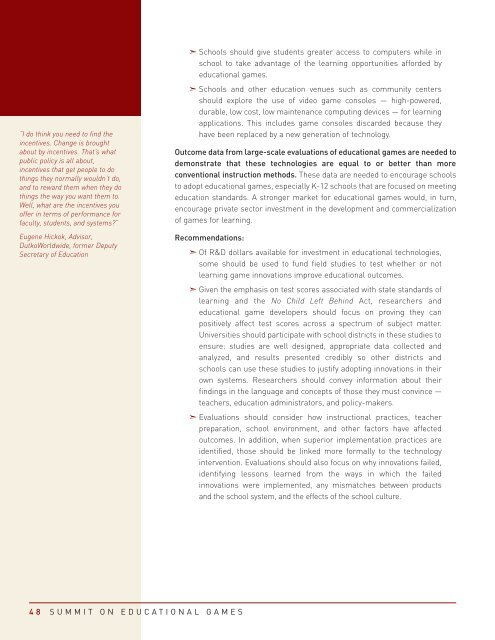Summit on Educational Games - Federation of American Scientists
Summit on Educational Games - Federation of American Scientists
Summit on Educational Games - Federation of American Scientists
Create successful ePaper yourself
Turn your PDF publications into a flip-book with our unique Google optimized e-Paper software.
“I do think you need to find the<br />
incentives. Change is brought<br />
about by incentives. That’s what<br />
public policy is all about,<br />
incentives that get people to do<br />
things they normally wouldn’t do,<br />
and to reward them when they do<br />
things the way you want them to.<br />
Well, what are the incentives you<br />
<strong>of</strong>fer in terms <strong>of</strong> performance for<br />
faculty, students, and systems?”<br />
Eugene Hickok, Advisor,<br />
DutkoWorldwide, former Deputy<br />
Secretary <strong>of</strong> Educati<strong>on</strong><br />
➣ Schools should give students greater access to computers while in<br />
school to take advantage <strong>of</strong> the learning opportunities afforded by<br />
educati<strong>on</strong>al games.<br />
➣ Schools and other educati<strong>on</strong> venues such as community centers<br />
should explore the use <strong>of</strong> video game c<strong>on</strong>soles — high-powered,<br />
durable, low cost, low maintenance computing devices — for learning<br />
applicati<strong>on</strong>s. This includes game c<strong>on</strong>soles discarded because they<br />
have been replaced by a new generati<strong>on</strong> <strong>of</strong> technology.<br />
Outcome data from large-scale evaluati<strong>on</strong>s <strong>of</strong> educati<strong>on</strong>al games are needed to<br />
dem<strong>on</strong>strate that these technologies are equal to or better than more<br />
c<strong>on</strong>venti<strong>on</strong>al instructi<strong>on</strong> methods. These data are needed to encourage schools<br />
to adopt educati<strong>on</strong>al games, especially K-12 schools that are focused <strong>on</strong> meeting<br />
educati<strong>on</strong> standards. A str<strong>on</strong>ger market for educati<strong>on</strong>al games would, in turn,<br />
encourage private sector investment in the development and commercializati<strong>on</strong><br />
<strong>of</strong> games for learning.<br />
Recommendati<strong>on</strong>s:<br />
48 SUMMIT ON EDUCATIONAL GAMES<br />
➣ Of R&D dollars available for investment in educati<strong>on</strong>al technologies,<br />
some should be used to fund field studies to test whether or not<br />
learning game innovati<strong>on</strong>s improve educati<strong>on</strong>al outcomes.<br />
➣ Given the emphasis <strong>on</strong> test scores associated with state standards <strong>of</strong><br />
learning and the No Child Left Behind Act, researchers and<br />
educati<strong>on</strong>al game developers should focus <strong>on</strong> proving they can<br />
positively affect test scores across a spectrum <strong>of</strong> subject matter.<br />
Universities should participate with school districts in these studies to<br />
ensure: studies are well designed, appropriate data collected and<br />
analyzed, and results presented credibly so other districts and<br />
schools can use these studies to justify adopting innovati<strong>on</strong>s in their<br />
own systems. Researchers should c<strong>on</strong>vey informati<strong>on</strong> about their<br />
findings in the language and c<strong>on</strong>cepts <strong>of</strong> those they must c<strong>on</strong>vince —<br />
teachers, educati<strong>on</strong> administrators, and policy-makers.<br />
➣ Evaluati<strong>on</strong>s should c<strong>on</strong>sider how instructi<strong>on</strong>al practices, teacher<br />
preparati<strong>on</strong>, school envir<strong>on</strong>ment, and other factors have affected<br />
outcomes. In additi<strong>on</strong>, when superior implementati<strong>on</strong> practices are<br />
identified, those should be linked more formally to the technology<br />
interventi<strong>on</strong>. Evaluati<strong>on</strong>s should also focus <strong>on</strong> why innovati<strong>on</strong>s failed,<br />
identifying less<strong>on</strong>s learned from the ways in which the failed<br />
innovati<strong>on</strong>s were implemented, any mismatches between products<br />
and the school system, and the effects <strong>of</strong> the school culture.
















